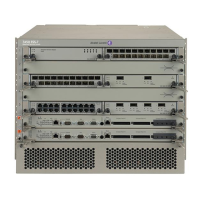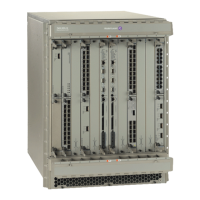Network QoS Policies
Quality of Service Guide 127
Parameters policer-id — The policer-id must be specified when executing the policer command. If the
specified ID already exists, the system enters that policer's context to allow the policer’s
parameters to be modified. If the ID does not exist and is within the allowed range for the QoS
policy type, a context for the policer ID will be created (depending on the system's current
create keyword requirements which may require the create keyword to actually add the new
policer ID to the QoS policy) and the system will enter that new policer’s context for possible
parameter modification.
Values 1 to 32 ingress
Values 1 to 8 egress
port-redirect-group
Syntax port-redirect-group {queue queue-id | policer policer-id [queue queue-id]}
no port-redirect-group
Context config>qos>network>egress>fc
Description This command is used to redirect the FC of a packet of a PW or network IP interface to an egress port
queue-group.
It defines the mapping of a FC to a queue-id or a policer-id and a queue-id, and redirects the lookup of
the queue or policer of the same ID in some egress port queue-group instance. However, the queue-
group name and instance are explicitly provided only at the time the network QoS policy is applied to
egress context of a spoke-sdp or a network IP interface.
The no version of this command removes the redirection of the FC.
Parameters queue-id — This parameter must be specified when executing the port-redirect-group
command. The specified queue-id must exist within the egress port queue group on each IP
interface where the network QoS policy is applied.
Values 1 to 8
policer id — The specified policer-id must exist within the queue-group template applied to the
ingress context of the forwarding plane.
Values 1 to 8
dscp
Syntax dscp dscp-name [fc fc-name] [profile {in | out}]
no dscp dscp-name
Context configure>qos>network>egress
